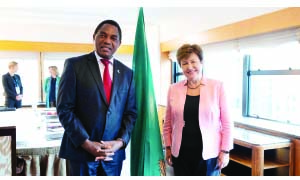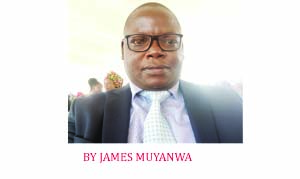INTERNATIONAL Monetary Fund (IMF) Managing Director Kristalina Georgieva has been in Zambia since Sunday on her official visit under the theme, “Building a more resilient and inclusive future in Sub-Saharan Africa”.
Today, we conclude the two-part article on Ms Georgieva’s first interview in Zambia which she gave to our Business Editor, JAMES MUYANWA, who has been following IMF issues for more than 10 years.
This final part interview covers issues ranging from IMF work with the current Zambian government on the fight against corruption to some of the IMF success stories as follows:
JAMES: How is the IMF working with the current government to promote transparency, reduce the risk of corruption and address some of the mismanagement from the past?
MS GEORGIEVA: Thank you for asking about this hugely important issue. Strengthening the governance of public institutions and reducing the risk of corruption are critical—to ensure that scarce public resources are used as effectively as possible, and contribute to promoting inclusive and sustainable growth.

Here, I want to applaud and endorse the authorities’ zero-tolerance approach to corruption. At the request of H.E. President Hichilema, and to support the Government’s anticorruption agenda, the IMF has provided technical assistance to Zambia to prepare a Diagnostic Report on Governance and Corruption.
The report provides our assessment of key shortcomings in the governance of public institutions in Zambia, as well as recommendations on how to address them. This comprehensive set of reform recommendations will require careful sequencing and continued strong political will, and we will continue to work with the Government to support implementation of their plans going forward.
JAMES: How do you compare the IMF of yesteryears, say of the 1990’s, and the current one in terms of the economic benchmarks or conditions for borrowers, like Zambia? What are the possible effects of the policy measures on, say, social sector expenditure and employment? (Any freeze?). Has there been a shift on these issues?
MS GEORGIEVA: I cannot emphasise enough that the IMF is here to support the Government’s own efforts. Without the Government’s leadership on a comprehensive economic reform agenda—which is wide-reaching, going beyond the reforms supported by the IMF program—we would not see these positive confidence effects in the economy.
But it’s also important to keep in mind that dealing with economic challenges is not easy, but our ultimate goal is to support better policies that can create a better future for people.
For instance, a key objective of the program is to gradually increase the level and quality of social spending to reduce poverty, as well as improve access to basic social services, especially in rural areas.
In fact, 41,000 additional education and healthcare workers were hired last year, social spending is set to increase during the life of the IMF-supported program, and there is now free primary and secondary education for all.
JAMES: What have been some of the success stories in terms of countries, in Africa and beyond, which have been ‘rescued’ by the Fund’s programmes from their respective economic quagmires?
MS GEORGIEVA: From my experience, home-grown reforms—what we often refer to as “ownership”—translate into success. Reform ownership is globally recognised as a critical ingredient to strong growth and investment, and we can clearly see this playing out here in Zambia.
But we must also recognise that the cumulative effects of successive global shocks in a more uncertain world adversely affect countries.
The COVID-19 pandemic, for example, put severe strains on countries all around the world.
And I am proud that the IMF provided nearly $50 billion of support to sub-Saharan Africa since the beginning of the pandemic, expanding fiscal space for countries to better protect their people and their economies.
For me, the fact that the Fund has stood with its members and supported them in dealing with this shock is a major success.
JAMES: What are some of the challenges, risks, and possible hitches of the current IMF programme for Zambia? What could hinder the programme’s effective implementation and how could that be prevented?
MS GEORGIEVA: The most prominent risk we see at the moment is a prolonged delay for Zambia and its creditors to reach an agreement on debt restructuring. This would undermine confidence and hold back economic prospects for the whole economy.
But I also want to be clear: the Zambian authorities are doing their part and making progress on restoring economic stability, so we are encouraging all creditors to make speedy progress toward an agreement. This is in everyone’s interest.
Like so many other countries, Zambia faces an array of global risks. China’s exit from zero-Covid could falter and lead to lower growth, the war in Ukraine could escalate, and global copper prices could drop.
For Zambia, lower copper prices, in particular, would reduce export earnings and tax revenues, making it even more difficult to meet the needs of the Zambian people.
JAMES: Where does the IMF see Zambia after the completion of the current programme? What next after the ECF arrangement? What could be some of the achievements the country is envisaged to have scored by then?
MS GEORGIEVA: By the end of the programme, we would like to see debt sustainability restored and Zambia advancing along the path of resilient and inclusive growth.
This will provide space in the budget to meet Zambia’s development needs, especially to support educating Zambia’s young people.
We also want to see strengthened governance of public institutions, with more transparency and accountability and, therefore, a lower risk of corruption.
For example, improving public financial management would be an important achievement for Zambia and would help ensure that its public resources are put to best use for the population.
As I mentioned before, it’s about good policies to get good outcomes for people.
Zambia has fantastically energetic and young population, and abundant natural resources. This means it has enormous potential to be a great country to invest in!
With continued strong economic policies, that investment will come through, and your country can build a brighter future for all.







